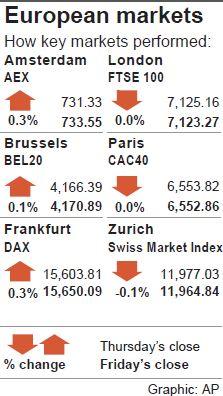European shares on Friday ended slightly higher thanks to a boost from chipmakers, although increases were capped by weak bank stocks and growing concerns over the Delta variant of SARS-CoV-2.
The pan-European STOXX 600 index rose 0.26 percent to close at 456.81 points, but lost 0.18 percent from a week earlier.
ASML GAINS

Technology stocks rose 1.1 percent, with semiconductor maker ASML Holding NV up 1.4 percent after Micron Technology Inc said that it plans to start using ASML extreme ultraviolet lithography machines in production in 2024, while ASM International NV rose nearly 2.5 percent as it forecast higher order intake in the second quarter.
Bank stocks fell 1.3 percent and were the worst performers, as growing concerns over the new, highly infectious SARS-CoV-2 variant kept investors firmly in fixed income and brought down yields.
Decent US payrolls data also did little to push up borrowing rates. The bank sector lagged its peers for the week with a 2.4 percent loss.
Still, it is the best performing eurozone sector so far this year, as rising inflation expectations had pushed borrowing costs higher earlier in the year.
NEW VIRUS VARIANT
The STOXX 600 ended the week slightly lower as investors feared that the new variant could dent an ongoing economic recovery.
Data showed producer prices in the bloc accelerated more than expected in May on a surge in energy prices.
“Inflation is still clients’ most popular risk to discuss at global level, but considering the European area’s delayed reopening, subdued wage growth and limited fiscal stimulus, the evolution of the Delta variant is a more pressing issue,” TS Lombard senior economist Davide Oneglia wrote in a note.
FTSE 100 UNCHANGED
London’s FTSE 100 ended flat on Friday, dragged by weakness in banks and energy stocks, and posted a weekly loss pressured by concerns over surging COVID-19 infections in the UK.
After gaining as much as 0.52 percent, the blue-chip index FTSE 100 ended 0.03 percent lower at 7,123.27, with banks being the biggest drag. It declined 0.18 percent from a week earlier.
Energy stocks fell 0.8 percent with oil majors BP PLC and Royal Dutch Shell PLC down 1.0 percent and 0.8 percent respectively, tracking weaker crude.
Miners jumped 0.9 percent and were the top gainers, with Anglo American PLC among the top boosts to the blue-chip index.

POWERING UP: PSUs for AI servers made up about 50% of Delta’s total server PSU revenue during the first three quarters of last year, the company said Power supply and electronic components maker Delta Electronics Inc (台達電) reported record-high revenue of NT$161.61 billion (US$5.11 billion) for last quarter and said it remains positive about this quarter. Last quarter’s figure was up 7.6 percent from the previous quarter and 41.51 percent higher than a year earlier, and largely in line with Yuanta Securities Investment Consulting Co’s (元大投顧) forecast of NT$160 billion. Delta’s annual revenue last year rose 31.76 percent year-on-year to NT$554.89 billion, also a record high for the company. Its strong performance reflected continued demand for high-performance power solutions and advanced liquid-cooling products used in artificial intelligence (AI) data centers,

SIZE MATTERS: TSMC started phasing out 8-inch wafer production last year, while Samsung is more aggressively retiring 8-inch capacity, TrendForce said Chipmakers are expected to raise prices of 8-inch wafers by up to 20 percent this year on concern over supply constraints as major contract chipmakers Taiwan Semiconductor Manufacturing Co (TSMC, 台積電) and Samsung Electronics Co gradually retire less advanced wafer capacity, TrendForce Corp (集邦科技) said yesterday. It is the first significant across-the-board price hike since a global semiconductor correction in 2023, the Taipei-based market researcher said in a report. Global 8-inch wafer capacity slid 0.3 percent year-on-year last year, although 8-inch wafer prices still hovered at relatively stable levels throughout the year, TrendForce said. The downward trend is expected to continue this year,

Vincent Wei led fellow Singaporean farmers around an empty Malaysian plot, laying out plans for a greenhouse and rows of leafy vegetables. What he pitched was not just space for crops, but a lifeline for growers struggling to make ends meet in a city-state with high prices and little vacant land. The future agriculture hub is part of a joint special economic zone launched last year by the two neighbors, expected to cost US$123 million and produce 10,000 tonnes of fresh produce annually. It is attracting Singaporean farmers with promises of cheaper land, labor and energy just over the border.

US actor Matthew McConaughey has filed recordings of his image and voice with US patent authorities to protect them from unauthorized usage by artificial intelligence (AI) platforms, a representative said earlier this week. Several video clips and audio recordings were registered by the commercial arm of the Just Keep Livin’ Foundation, a non-profit created by the Oscar-winning actor and his wife, Camila, according to the US Patent and Trademark Office database. Many artists are increasingly concerned about the uncontrolled use of their image via generative AI since the rollout of ChatGPT and other AI-powered tools. Several US states have adopted